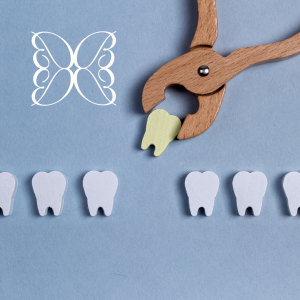Extractions
Wisdom tooth removal is usually considered to correct an actual problem or to prevent problems that may come up in the future. Removal of wisdom teeth can prevent crowding of the teeth, the wisdom tooth becoming stuck in the jaw (impacted), infection of the tissue surrounding a partially exposed wisdom tooth, and gum disease and tooth decay in the wisdom tooth, which may be harder to clean.

Sometimes, dental extractions are necessary for the health and longevity of surrounding teeth!
Following an extraction, the recovery period should last only a few days. The following tips will help speed your recovery.
- Take all medication as instructed, as this will help the healing and pain control.
- Bite gently on the gauze pad periodically (or a moist tea bag), and change pads as they become soaked with blood. Call us if you still have bleeding 24 hours after your surgery.
- You may experience a slight fever or chills. Please call us if it persists for more than 24 hours or rises above 101 degrees.
- While your mouth is numb, be careful not to bite the inside of your cheek or lip, or your tongue.
- Do not lie flat. This may prolong bleeding. Prop up your head with pillows.
- Try using an ice pack on the outside of your cheek for the first two to three hours (20 minutes on followed by 20 minutes off). You can use moist heat-such as a washcloth soaked in warm water and wrung out-for the following 2 or 3 days.
- Relax after surgery. Physical activity may increase bleeding.
- Eat soft foods, such as gelatin, pudding, or a thin soup. Gradually add solid foods to your diet as healing progresses.
- Do not use a straw for the first few days. Sucking on a straw can loosen the blood clot and delay healing.
- After the first day, gently rinse your mouth with warm salt water or anti-microbial rinse several times a day to reduce swelling and relieve pain.
- Do not smoke for at least 24 hours after your surgery. The sucking motion can loosen the clot and delay healing. In addition, smoking decreases the blood supply and can bring germs and contaminants to the surgery area.
- Avoid rubbing the area with your tongue, touching it with your fingers and looking at the area in a mirror.
- Continue to brush your teeth and tongue carefully, avoiding the treated area.
- Your dentist will remove the stitches after a few days, if needed.